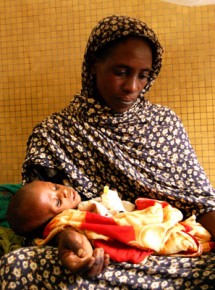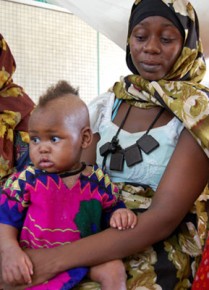
Since December last year, UNICEF has been warning of a looming food crisis in the Sahel region of West Africa, where more than one million very young children will suffer from life-threatening malnutrition this year. I've just returned from a visit to Chad, one of the eight countries affected by this crisis that has resulted from drought, poor harvests, and rising food prices. From what I saw, it was clear that we are no longer on the brink of disaster – it is already here, and it is going to get worse in the coming weeks.
At a health centre in Abeche, a small town in the arid Sahelian belt in Eastern Chad, I met a tiny 16-month-old boy called Ali in the hospital unit where malnourished children with medical complications are treated. His mother, Khadadya, told me that Ali was in a coma when they arrived after travelling for more than 40km from their home. Ali was suffering from diarrhoea and marasmus, a form of severe protein deficiency. But thanks to the medical treatment and specialist therapeutic food he received, Ali was now on the road to recovery.

Another baby I met in the hospital unit was 18-month-old Fatima who had developed kwashiorkor, an acute form of malnutrition characterised by swelling. She was brought to the centre by her mother, having travelled 90km by donkey and by car. Kwashiorkor can affect the kidneys and the heart, but fortunately tests have confirmed that Fatima’s organs are fine.
It seems wrong to say this, but Ali, Fatima and all the other children I met at the health centre were “the lucky ones”. They were the ones who were getting the right kind of therapeutic food to treat malnutrition and appropriate medical treatment, and had the best chance of survival. Sadly, there are many children who may never get to a health centre because they live too far away, or who may be too sick by the time they get there.
One of the issues which we kept encountering was the incredibly long distances that some mothers had travelled with their babies, usually on foot or by donkey, in the blistering heat. For many families, the nearest health centre would be at least 30km away. Such difficult journeys often mean that children only come once, and do not get further support when they return to their homes. This is why UNICEF is making it an urgent priority to almost double the number of health centres from 235 to 435, in order to reach all of the 127,000 Chadian children who are likely to suffer from severe malnutrition this year.
The head of UNICEF’s office in Chad, Bruno Maes, explained how they wanted to use this emergency response to build the country’s health capacity, to lay the foundations for longer term development. There is little health infrastructure in Chad. After decades of conflict and weak governance, only about half the health facilities in the country are functioning. UNICEF currently supports the health centres with virtually everything, from doctors and nurses, to therapeutic food and stethoscopes. We want these centres to become permanent, run by the government and staffed by Chadian paramedics. Equally important is the need to expand the work we do at the community level, where community leaders in villages identify any children showing signs of malnutrition and refer them to the nearest health centre. The earlier they receive treatment, the greater their chances of survival.
What was clear from my visit was the growing sense of urgency. The crisis is expected to reach its peak in June or July when the rains come, so we need to get more emergency supplies into the region as soon as possible before the roads become impassable. The window of opportunity is closing.
With crucial support from the UK Government, UNICEF has already treated nearly 30,000 severely malnourished children in Chad between January and March this year. The public in the UK have also been very generous, notably through ‘Soccer Aid’ which was broadcast on ITV1 on May 27 and has already raised over £2 million. Wonderfully, every pound raised at this event is being matched by the UK Government, resulting in over £4 million for our work for children. This is a truly fantastic achievement and much of this money raised will help us to save many more children's lives in the Sahel region.
But we still need more funds to get more supplies in, to build more health centres and to train more paramedics. The message I kept hearing was clear: act now or lose lives. Across the eight affected countries of the Sahel, the lives of a million children hang in the balance. Sadly, our teams on the ground cannot be confident that all lives will be saved, but you can be assured that we will try our hardest to do what we can to prevent needless deaths.
For more information about our response to the Sahel crisis, or to make a donation, visit www.unicef.org.uk
Please note, this is a guest blog. Views expressed here do not necessarily represent the views of DFID or have the support of the British Government.
 UK aid is changing lives - find out how and get involved on our Facebook page.
UK aid is changing lives - find out how and get involved on our Facebook page.

3 comments
Comment by Chadian posted on
Bringing hope for children in West Africa ? I hope for all Africa and by the way my beautiful and lovely country it is in central Africa not west Africa
Thank
Comment by Simon Davis posted on
Hi Chadian,
The reference to West Africa is because it is the current focus due to the food crisis in the Sahel region. DFID works in many countries in Africa with its partners and you can find out more information on where we work here: http://www.dfid.gov.uk/Where-we-work/
Comment by John Olusanu posted on
I believe in what UNICEF is doing my organization will soon join the UNICEF in combating protein defficiency in African children.
Our goal is to ensure that an average African child as access to at least 0.7kg-1.0kg of fish per meal and ...